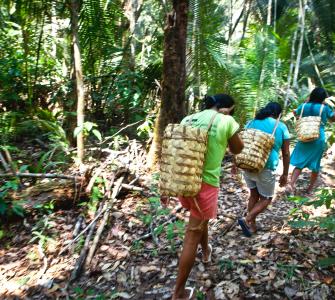CSF is doing an economic feasibility analysis of the implementation of the Agro-extractivist Cooperatives and Associations Network of the State of Amazonas (RECABAAM) to help improve the Brazil nut value chain.
Traditional peoples and communities' agro-extrativist associations and cooperatives in Protected Areas in the Brazilian state of Amazonas face several challenges. These are mainly related to their businesses' management and the commercialization of their products, such as the Brazil nut, pirarucu fish and fruits, among others.
To find ways to overcome some of these challenges, meetings have been organized between local leaders and NGOs. Representatives from various organizations are participating, including: the Brazil nut Producers from Amaturá Municipality Association (Portuguese acronym, APROCAM), Farmers from Beruri Association (ASSOAB), Unini River Agroextractivist Cooperative (COOMARU), Mixed Agroextrativist Sardinha Cooperative (COOPMAS) and the Green Cooperative from Manicoré (COVEMA), supported by the Vitória Amazônia Foundation (FVA), Native Amazon Operation OPAN), Brazilian International Institute of Education (IEB) and CSF.
One strategy being considered to strengthen sustainable businesses of socio-biodiversity products is to share information about markets, resources and good management practices, as well as specific recommendations to access new markets.
Thus, to strengthen the Brazil nut value chain and its organizations, the creation of a cooperation network, the RECABAAM, has been proposed. Within the arrangement of institutions involved in the process, CSF’s role is to analyze the economic feasibility of the network's implementation. Possible benefits - such as increased revenue and cost reduction - will be identified and analyzed to find out if they cover RECABAAM's investment and maintenance costs. Then, CSF will develop recommendations for the network’s strategic approach, if determined feasible.
With this network, we hope to contribute to the continuation of agro-extractive activities and family farming, as both are an important income source for several indigenous peoples and traditional communities in the Amazon region.
This study is being conducted in partnership with the FVA, OPAN and IEB, and supported by the Chico Mendes Biodiversity Conservation Institute (ICMBio), the Brazilian government’s National Indian Foundation (FUNAI), the United States Forest Service (USFS) and the United States Agency for International Development (USAID), under the project "Partnership for Biodiversity Conservation in the Brazilian Amazon: Sustainable Value Chains".
The picture above shows some women of the Paiter Surui people collecting babassu fruit in the Sete de Setembro Indigenous Land in the state of Rondônia (2011).
Photo Credit: Fernanda Preto.

